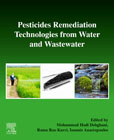
Pesticides Remediation Technologies from Water and Wastewater
Hadi Dehghani, Mohammad
Karri, Rama
Anastopoulos, Ioannis
Pesticides Remediation Technologies from Water and Wastewater focuses on environmental aspects and health effects of pesticides, the use of conventional and AOPs technologies, and adsorption processes and nanomaterials for the removal of pesticides from water and wastewater. The deterioration of water quality is of great concern due to its effects on aquatic organisms, humans and the ecosystem. Among the pollutants, pesticides are a major concern in villages and farm land. This edited book bridges the gap between old and new knowledge about the categorization of pesticides, the presence of them in water, wastewater, soil and foods, and new methods to detect them from water matrices. This edited book provides the necessary basic knowledge to new researchers who want to learn about pesticides and the ways to eliminate them in aqueous matrices. Moreover, it is also a helpful resource for mature researchers in this field, providing them with new trends in water and wastewater treatment processes, preparation and application of novel adsorbent materials. Includes methods for effectively removing pesticides from potable water and water bodies Provides techniques that are eco-friendly and that do not use toxic chemicals and are lower in cost Presents information needed to identify severe health effects on human beings and aquatic animals INDICE: Section 1. Health effects of pesticides and its analytical techniques 1. Pesticides and its Human Health Implications 2. Presence, fate and transport of sulfonylurea herbicides in soils 3. Analytical methodologies and techniques for pesticide residue analysis Section 2. Conventional treatment for the removal of pesticides 4. Conventional treatment for removal of pesticides from water and wastewater Section 3. Advanced oxidation processes for the removal of pesticides 5. Advanced oxidation processes (AOPs) for removal of pesticides from water and wastewater 6. Recent aspects and modification in advanced oxidation processes for pesticide management in wastewater Section 4. Membrane technology for the removal of pesticides 7. Membrane separation technology for removal of pesticides from water and wastewater Section 5. Adsorption processes for the removal of pesticides 8. Basic fundamentals of Adsorption modelling for removal of pesticides from water and wastewater 9. New generation Adsorbents for removal of pesticides from water and wastewater 10. An overview on the removal of pesticides from water and wastewater through carbonaceous adsorbents Section 6. Nanomaterials and Nanocomposites for the removal of pesticides 11. Remediation of Pesticides Residues from Contaminated Water using various Nanomaterials and Nanocomposites 12. Competence of Nanoparticle for Removal of Pesticides from Wastewater: An Overview 13. Advance remediation technologies for the removal of organochlorine from water and wastewater 14. Bioremediation of pesticides from water and wastewater Section 7. Bioremediation for the removal of pesticides 15. Bioremediation and Phytoremediation of Pesticides Contaminated Aquatic Reserves- A Noval Approach 16. Bioremediation technologies for pesticides removal from wastewater: Strategies and challenges 17. Genotoxic Effects and Bacteria-Related Bioremediation of Pesticides 18. Soil toxicity and remediation techniques 19. Reclamation of groundwater polluted with pesticide residues using binary semiconductor materials under natural sunlight for its reuse in crop irrigation
- ISBN: 978-0-323-90893-1
- Editorial: Elsevier
- Encuadernacion: Rústica
- Páginas: 414
- Fecha Publicación: 01/06/2022
- Nº Volúmenes: 1
- Idioma: Inglés
